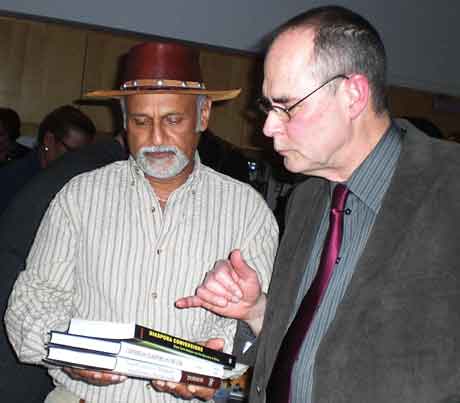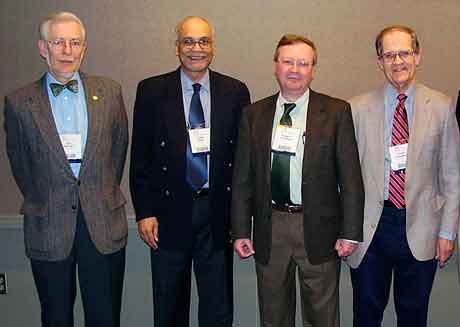In the News
Trinidadian Scholar in Best Lecturer award Finals

By William Doyle-Marshall
Professor Anton Lawrence Allahar, a Trinidad-born scholar is among ten finalists vying for the 2009 TV Ontario best lecturer award in the station’s Big Ideas series. The winning professor will receive $10,000 TD Insurance Meloche Monnex scholarship for their university.
Allahar’s lecture is entitled ‘Why is the whole world not developed?’ The original round of contestants began with about 300 nominees and the remaining 290 have been eliminated.
The professor’s selection by his students to represent the University of Western Ontario was supported by the institution’s president and deans. And he is very flattering because he knows lots of outstanding teachers, great educators, compassionate colleagues whose names are not there. He would like to think the exercise is not for him but he is representing “all of us who are passionate about teaching tomorrow’s generation.” Professor Allahar noted that very often tomorrow’s generation is not about younger generation. “It is people of our generation who have come back to school to get a fresh perspective on the world, fresh perspective on life,” he added.
Allahar, a full professor of Caribbean and Latin American studies at the University of Western Ontario, in London is immediate past president of Caribbean Studies Association – a sort of think tank for various Caribbean Governments.
Other contestants are Rod Carley professor of Communication Arts - Canadore College - Adapting Shakespeare within a Modern Canadian Context; Merv Mosher School of Kinesiology and Health Science - York University; Claire Hasenkampf, Biological Sciences department at the University of Toronto - Chromosomes Dividing - How It Is Done and Why It Matters; Daryl Davies, Sociology & Anthropology department at Carleton University - Explaining Crime; Doug Richards – Physical Education and Health, University of Toronto – Stretching the Truth; James Allard – English Language and Literature, Brock University - Frankenstein, Five Ways; Matthew Bellamy – History Department, University of Ottawa - A Watershed Moment: Canada and the Second World War; Paul Stevens – English Department, University of Toronto—Milton’s Satan; Shawn Lehman – Anthropology Department, University of Toronto “Primate Infanticide: Adaptation or Social Pathology?”
The lecturers have been featured on TV Ontario (television) every Saturday and Sunday for five weeks from February 28 to March 29. The final two presenters were aired this past weekend (end of march). However between April 1 through April 15, online voting will be done through (TVO.org) the Best Lecturer website; through a mobile device by texting the word vote to short code 333111* or by calling 1.866.281.3536.
The judging takes place in two ways. A panel of judges will account for 50% of the decision but the viewing pubic can call in, text in or go on line and vote or rate the different professors as they view them.
The winner will be selected towards the end of the voting. Lectures can still be viewed on line.
Viewers are able to judge each professor in three categories: confidence and authority; clarity and coherence; and energy and enthusiasm. Consideration has to be given to how articulate they were, how much they dominate their subject material, how authoritative they were with respect to presenting their ideas.
In the past six-seven years he won the major teaching awards including the 3M National Fellows Award which is the outstanding professor award in Canada; the Ontario Colleges and University Faculty Association Award (OCUFA) and the 2008 Leadership in Faculty Teaching (LIFT) sponsored by the Government of Ontario.
Professor Allahar left Trinidad in 1969. Asked what he misses most, he admitted it was a tough question and doubted whether the answer could be entirely covered in a quick exchange. However he missed a lot more long ago when “Trinidad was farther away”. But now that Trinidad is much closer (via the telephone, television, email) plus having been in Canada 40 years, he is more settled in his job and with more money at his disposal, he is able to travel more frequently. “Add to that the fact that I am a Caribbeanist in my specialisation so I go down to the Caribbean and Latin America three, four, five times a year.”

Dr. M. Jamal Deen, professor of electrical and computer engineering at McMaster, and Senior Canada Research Chair in Information Technology, has been elected a Fellow of the American Physical Society (APS). He is the first engineering professor at McMaster to receive this recognition.
The Fellow Awards were presented at the APS Annual March meeting held between 16-20 March 2009 in Pittsburgh and attended by approximately 8000 pure and applied scientists.
Prof. Deen’s Fellow Award from the Industrial and Applied Physics Section of APS, was presented on March 17, 2009. A dinner to honor the IAP Fellow Awardees was also held in Pittsburgh on the same evening.
The APS Fellow Award also places Prof. Deen in a rare position in Canada, that of being elected Fellow of APS, the Institute of Electrical and Electronic Engineers (IEEE) and the Electrochemical Society (ECS) for his scholarly work in science, engineering and technology.
The American Physical Society, founded on May 20, 1899, now counts some 46,000 members and is the largest physics society in the world. One of its visions is to “be the leading voice for physics and an authoritative source of physics information for the advancement of physics and the benefit of humanity.”
Each year, no more than one half of one percent of the Society membership is recognized by their peers for election to the status of Fellow in the American Physical Society. Prof. Deen is recognized for his pioneering “contributions to noise and physics-based modeling of semiconductor devices and innovations in experiments.”
Prof. M. Jamal Deen is also recognized by his peers as a major contributor and world leader in microelectronics/nanoelectronics and optoelectronics. He anchors innovative, important contributions in noise and modeling of semiconductor devices in fundamentals of physics by combining physics-based modeling with clever experiments.
Professor Deen’s peers have also elected him to the highest status in three national academies and four professional societies including Fellow of the Royal Society of Canada - The Academies of Arts, Humanities and Sciences of Canada (which is the highest honor that can be attained by scholars, artists and scientists in Canada), Fellow of the Canadian Academy of Engineering (the highest honor for engineers in Canada) and a Foreign Fellow of the Indian National Academy of Engineering - thus placing him in the topmost academic and research echelons worldwide.
Dr. Deen holds numerous additional awards and distinctions. Most recently, he was awarded the prestigious Thomas W. Eadie Medal by the Royal Society of Canada (November 2008) and he returned from Germany (in summer 2008) where he conducted research on the modeling of nanoscale semiconductor devices and their applications to millimeter and microwave systems as a recipient of the prestigious Humboldt Research Award from the Alexander von Humboldt Foundation. Earlier in 2008, he was honored by the Guyana Awards (Canada) Council as the 2008 Academic Excellence Awardee in recognition of his outstanding research and academic work.
Born in Georgetown Guyana, Dr. Deen attended Queen’s College where he was a regular prize winner. He then attended University of Guyana, majoring in Mathematics/Physics, winning the Irving Adler Prize as the best graduating mathematics student and the Chancellor’s Medal as the second best student graduating student in the University, both in 1978. For his graduate studies, he won the highly prestigious Fulbright-LASPAU Scholarship and was an American Vacuum Society Scholar.